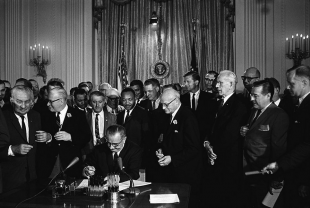Civil rights is an ever changing concept. Since the very founding of our country, this movement, or series of movements, has been a foundation on which people raise their flags and rally. As society is ever evolving, so is our definition of civil rights. 50 years ago tomorrow the Civil Rights Act of 1964 was passed. Title VII of this revolutionary act is recognized, and in many cases memorized, by HR departments everywhere. It made it unlawful for any employer to “fail or refuse to hire or to discharge any individual, or otherwise to discriminate against any individual with respect to his compensation, terms, conditions, privileges or employment, because of such individual’s race, color, religion, sex, or national origin.”
This act was a revolution but only one step in a continuous process; civil rights is an ongoing conversation. Today debates continue about gender, sexual orientation, relationship status, and so many other issues. If you work in HR, or are looking to hire, awareness is your first step towards success.
Since the Civil Rights Act, there have been several other legal actions on the topic of discrimination in the workplace. They include:
- Age Discrimination in Employment Act of 1967
- Pregnancy Discrimination Act in the 1970s
- Americans with Disabilities Act of 1990
- Civil Rights Act of 1991
These acts cover several different kinds of protected classes but have not ended the controversy. Wage inequality for women and minorities and discriminatory hiring based on sexual orientation are only a few of the issues still being debated today. Opinions, regulations, and laws regarding these issues differ in each state. The landscape of civil rights is ever changing as regulations evolve to meet new challenges in civil rights. Your job is to be aware of these changes and adapt accordingly.
What exactly does this mean for HR?
Civil rights issues are topics of controversy that directly affect your HR department. Because the government can’t police everyone, much of the responsibility for equality falls on companies and HR departments. For this reason your company needs to be aware of recruiting a diverse workforce, not just to keep with regulations, but also because of the different skill sets and perspectives employing a diverse population presents you. Companies that hire diversely are opening themselves up to talent they may miss out on otherwise.
The key to reaching a diverse population is instituting a diverse recruiting strategy and ensuring fair treatment in the workplace. This includes being aware of the laws and regulations in your state, focusing on hiring diversly, putting in place diversity training for management, putting in place diversity training for employees, and stressing the importance of respect to all employees.
An example of a company that is doing exceedingly well hiring diversely is AT&T. Here is a breakdown of their diversity strategy:
- Hiring from a variety of backgrounds
- Providing an inclusive work environment by offering performance-based rewards
- Making their senior leaders accountable for leading diversity initiatives
- Creating the role of ‘Chief Diversity Officer’
- Utilizing diversity training
AT&T knows having a diverse workforce is critical to their success, so they specifically seek out employees who present a variety of perspectives.
Focusing on diversity education may be the key to reaching that goal of equality that was started with the passing of the Civil Rights Act in 1964. A simple way to do this is looking into implementing or improving your diverse hiring and culture-building strategy.
The passing of the Civil Rights Act was a predominant moment in our history, one of many such moments that have taken place since and are still to come. If you want to protect your company from legal action and ensure that you are recruiting the best talent in the market, it is vital that you are aware of the ever-changing civil rights landscape. Responsibility for diversity falls on everybody, but it starts with HR.
Photo: Lyndon B. Johnson signing the Civil Rights Act on July 2, 1964. Martin Luther King Jr. looks on. (Public Domain)






